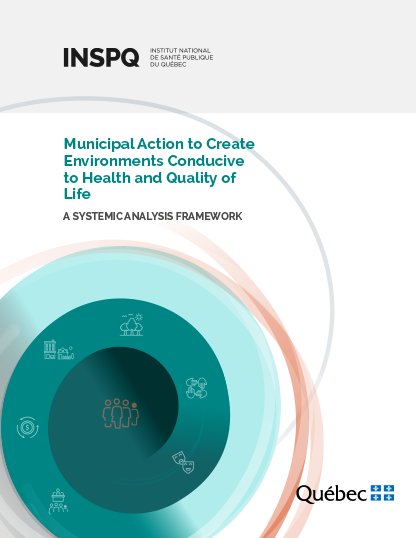Municipal Action to Create Environments Conducive to Health and Quality of Life
In Québec and around the world, growing urbanization of territories and current demographic, socioeconomic, cultural, environmental and health issues are having a significant impact on the health and quality of life of populations. The climate crisis, ecosystem degradation, poverty, social exclusion and, more recently, the pandemic, are just a few examples of the complex challenges that require a combination of interventions by all levels of government and in various sectors, particularly at the municipal level.
International organizations (WHO, UN) describe municipalities that are conducive to health and quality of life as being inclusive, equitable, safe, resilient and sustainable. Here, health is “a state of complete physical, mental and social well-being, and not merely the absence of disease or infirmity (WHO)”. In Québec, municipalities are considered to be local governments that “exercise essential functions and offer their population services that contribute to maintaining a high-quality, safe and healthy living environment. These living environments are shaped, at the local level, by a diversity of elements from the built, natural, economic, social, cultural and political environments. However, the local level is subordinate to the societal context at regional, provincial, national and international levels.
Municipalities have several areas of jurisdiction, powers and levers that have been conferred upon them by Québec government legislation so that they can modify the above-mentioned environments and make them more conducive to health and quality of life. For example, in accordance with section 2 of the Municipal Powers Act (MPA), a municipality has the power to adopt any by-law to ensure the general welfare of its population. In addition, under the provisions of this Act “municipalities are granted powers enabling them to respond to various changing municipal needs in the interest of their citizens”.
The implementation of certain municipal policies and actions by municipal departments (e.g. culture, recreation and community life, urban planning, environment, public safety, public works, civil protection) makes a variety of levers available to municipalities for acting on a range of factors that have a major influence on the health and well-being of their population.
However, municipalities cannot act alone. To ensure the success and sustainability of their actions, many public health experts and authorities consider it essential to set up internal and external collaboration mechanisms with a variety of partners, and at different stages of interventions.


